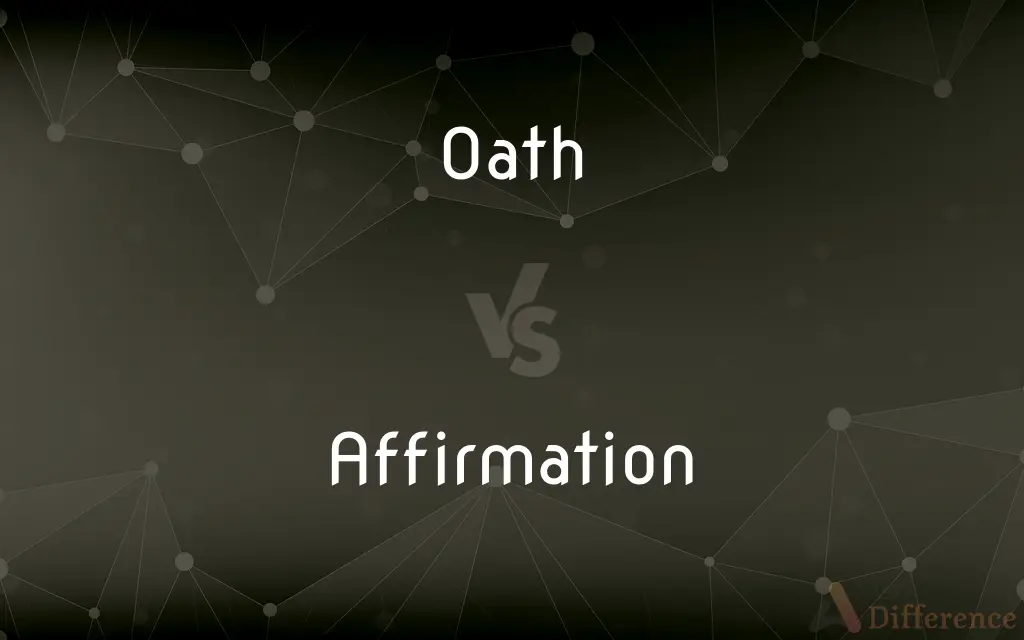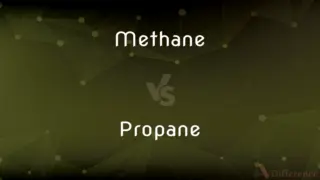Oath vs. Affirmation — What's the Difference?
By Fiza Rafique & Maham Liaqat — Updated on March 31, 2024
An oath is a solemn promise often invoking a divine witness, whereas an affirmation is a serious, personal declaration of truth without religious elements.

Difference Between Oath and Affirmation
Table of Contents
ADVERTISEMENT
Key Differences
An oath is a formal declaration or promise that is often accompanied by a swearing to a deity or a sacred object, indicating the seriousness and the spiritual significance of the commitment. On the other hand, an affirmation serves a similar legal or formal purpose but is secular in nature.
While oaths might be considered more traditional and carry a spiritual or religious connotation, affirmations are recognized for their ethical or moral weight, relying on the personal integrity of the individual. Both are legally binding and signify the individual's commitment to truth or duty. However, the choice between an oath and an affirmation often depends on personal beliefs, religious practices, and cultural backgrounds, reflecting the respect for diversity within society.
The legal implications of breaking an oath or an affirmation are typically the same, highlighting the importance of truth and integrity in formal declarations. In many jurisdictions, making false statements under either can lead to legal consequences, such as charges of perjury. This underscores the seriousness with which both oaths and affirmations are regarded in legal and official contexts.
Despite their differences, both oaths and affirmations fulfill the essential function of ensuring reliability and honesty in various settings. Whether one chooses to take an oath or make an affirmation, the key element is the solemn commitment to truthfulness and the acknowledgment of the significance of that commitment.
Comparison Chart
Nature
Spiritual/Religious
Secular
ADVERTISEMENT
Invocation
Divine witness or sacred object
Personal integrity
Common Usage
Courtrooms, official duties
Courtrooms, official settings for non-religious
Legal Binding
Yes
Yes
Consequences of Breach
Perjury or similar legal penalties
Perjury or similar legal penalties
Compare with Definitions
Oath
A solemn promise, often invoking a divine figure, to perform an act faithfully or tell the truth.
He took an oath to serve his country with honor.
Affirmation
Suitable for individuals of any or no religious affiliation.
Affirmations ensure that everyone's beliefs are respected in formal settings.
Oath
Breaking an oath can lead to legal or social consequences.
Breaking his oath of secrecy had serious repercussions.
Affirmation
A formal declaration of truth or commitment, without invoking religious beliefs.
He made an affirmation to tell the whole truth in court.
Oath
A binding promise made in a legal setting, swearing on a religious or sacred text.
The witness took an oath on the Bible before testifying.
Affirmation
A secular alternative to an oath in testimonies or official duties.
She chose to make an affirmation rather than swear an oath.
Oath
Traditional in many cultures, symbolizing a deep moral or ethical commitment.
Knights took oaths of fealty to their lords in medieval times.
Affirmation
Relies on the individual's sense of moral or ethical responsibility.
His affirmation was a pledge of his personal honor.
Oath
Often associated with a religious or spiritual belief system.
She made an oath by the old gods and the new.
Affirmation
Legally equivalent to an oath, emphasizing truthfulness and accountability.
Lying after making an affirmation is subject to the same penalties as breaking an oath.
Oath
Traditionally an oath (from Anglo-Saxon āð, also called plight) is either a statement of fact or a promise with wording relating to something considered sacred as a sign of verity. A common legal substitute for those who conscientiously object to making sacred oaths is to give an affirmation instead.
Affirmation
The action or process of affirming something
An affirmation of basic human values
He nodded in affirmation
Oath
A solemn promise, often invoking a divine witness, regarding one's future action or behaviour
They took an oath of allegiance to the king
Affirmation
Emotional support or encouragement
The lack of one or both parents' affirmation leaves some children emotionally crippled
Oath
A profane or offensive expression used to express anger or other strong emotions
He exploded with a mouthful of oaths
He was muttering foul oaths
Affirmation
The act of affirming or the state of being affirmed; assertion.
Oath
A solemn, formal declaration or promise to fulfill a pledge, often calling on God, a god, or a sacred object as witness.
Affirmation
Something declared to be true; a positive statement or judgment.
Oath
The words or formula of such a declaration or promise.
Affirmation
A statement intended to provide encouragement, emotional support, or motivation, especially when used for the purpose of autosuggestion.
Oath
Something declared or promised.
Affirmation
(Law) The assertion that the testimony one gives is true and equivalent to that which would be given while under oath.
Oath
An irreverent or blasphemous use of the name of God or something held sacred.
Affirmation
That which is affirmed; a declaration that something is true.
Oath
An imprecation; a curse.
Affirmation
(legal) The solemn declaration made by Quakers and others incapable of taking an oath.
Oath
A solemn pledge or promise that invokes a deity, a ruler, or another entity (not necessarily present) to attest the truth of a statement or sincerity of one's desire to fulfill a contract or promise.
Take an oath
Swear an oath
Break one's oath
Affirmation
A form of self-forced meditation or repetition; autosuggestion.
Oath
A statement or promise which is strengthened (affirmed) by such a pledge.
After taking the oath of office, she became the country's forty-third premier.
The generals swore an oath of loyalty to the country.
Affirmation
Confirmation of anything established; ratification; as, the affirmation of a law.
Oath
A light, irreverent or insulting appeal to a deity or other entity.
Affirmation
The act of affirming or asserting as true; assertion; - opposed to negation or denial.
Oath
A curse, a curse word.
Affirmation
That which is asserted; an assertion; a positive statement; an averment; as, an affirmation, by the vender, of title to property sold, or of its quality.
Oath
(archaic) To pledge.
Affirmation
A solemn declaration made under the penalties of perjury, by persons who conscientiously decline taking an oath, which declaration is in law equivalent to an oath.
Oath
A solemn affirmation or declaration, made with a reverent appeal to God for the truth of what is affirmed.
An oath of secrecy for the concealing of those [inventions] which we think fit to keep secret.
Affirmation
A statement asserting the existence or the truth of something
Oath
An appeal (in verification of a statement made) to a superior sanction, in such a form as exposes the party making the appeal to an indictment for perjury if the statement be false.
Affirmation
The act of affirming or asserting or stating something
Oath
A careless and blasphemous use of the name of the divine Being, or anything divine or sacred, by way of appeal or as a profane exclamation or ejaculation; an expression of profane swearing.
Affirmation
(religion) a solemn declaration that serves the same purpose as an oath (if an oath is objectionable to the person on religious or ethical grounds)
Oath
Profane or obscene expression usually of surprise or anger;
Expletives were deleted
Affirmation
A judgment by a higher court that the judgment of a lower court was correct and should stand
Oath
A commitment to tell the truth (especially in a court of law); to lie under oath is to become subject to prosecution for perjury
Oath
A solemn promise, usually invoking a divine witness, regarding your future acts or behavior;
They took an oath of allegience
Common Curiosities
What is an oath?
An oath is a solemn promise, often invoking a divine witness, to perform a specific act faithfully or to tell the truth.
Can choosing between an oath and an affirmation affect the validity of a testimony?
No, choosing between an oath and an affirmation does not affect the validity of a testimony as both are recognized equally under law.
Are oaths and affirmations legally binding?
Yes, both oaths and affirmations are legally binding and are taken seriously in legal contexts.
Do all religions support the taking of oaths?
Not all; some religions or individuals may prefer affirmations due to personal beliefs against swearing oaths.
Is an affirmation less serious than an oath?
No, an affirmation is equally serious and binding as an oath, relying on personal integrity.
Can an affirmation be used in all legal situations as an alternative to an oath?
Yes, affirmations are generally accepted as alternatives to oaths in legal settings.
What is the historical significance of oaths?
Oaths have been used historically to bind individuals to their word, indicating loyalty, fealty, or truthfulness.
Can an atheist make an oath?
An atheist might prefer an affirmation, which does not require invoking a deity, though the choice is personal.
Are there penalties for refusing to take an oath or affirmation in court?
Refusing to take an oath or affirmation in court can impede legal proceedings, but alternatives like affirmations are usually offered.
What is an affirmation?
An affirmation is a serious declaration of truth or commitment that is secular and does not invoke any religious elements.
How do cultural differences impact the preference for oaths or affirmations?
Cultural and religious backgrounds can influence whether individuals prefer to take oaths or make affirmations.
How does one decide between taking an oath or making an affirmation?
The decision is personal, often based on individual beliefs, religious practices, or the specific context in which the declaration is made.
Why might someone choose an affirmation over an oath?
Reasons include personal or religious beliefs that preclude swearing oaths, or a preference for a secular declaration.
What happens if someone breaks an oath or affirmation?
Breaking an oath or affirmation can lead to legal penalties, including charges of perjury.
Do oaths always involve a physical act, like placing a hand on a book?
Often, but not always; the physical act reinforces the solemnity of the oath but is not universally required.
Share Your Discovery

Previous Comparison
Atoll vs. Island
Next Comparison
Methane vs. PropaneAuthor Spotlight
Written by
Fiza RafiqueFiza Rafique is a skilled content writer at AskDifference.com, where she meticulously refines and enhances written pieces. Drawing from her vast editorial expertise, Fiza ensures clarity, accuracy, and precision in every article. Passionate about language, she continually seeks to elevate the quality of content for readers worldwide.
Co-written by
Maham Liaqat















































